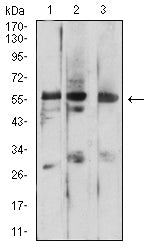
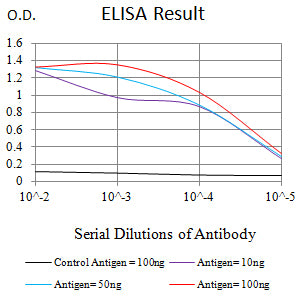
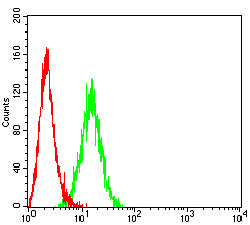
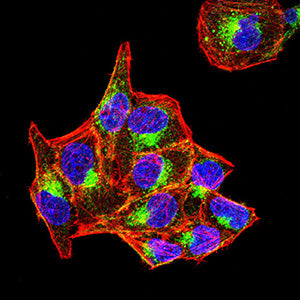
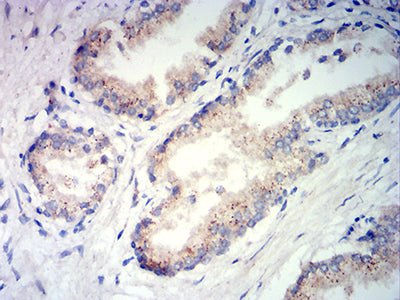
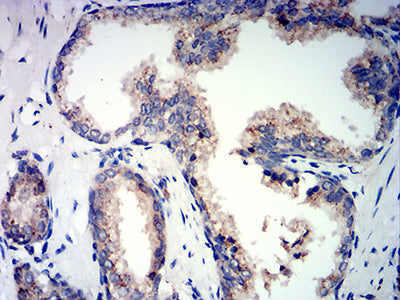
| WB | 1/500 - 1/2000 | Human,Mouse,Rat |
| IF | 咨询技术 | Human,Mouse,Rat |
| IHC | 1/200-1/1000 | Human,Mouse,Rat |
| ICC | 1/200 - 1/1000 | Human,Mouse,Rat |
| FCM | 1/200-1/400 | Human,Mouse,Rat |
| Elisa | 1/10000 | Human,Mouse,Rat |
| Aliases | GLBA; SAP1; SAP2 |
| Entrez GeneID | 5660 |
| clone | 3B4A8 |
| WB Predicted band size | 58.1kDa |
| Host/Isotype | Mouse IgG1 |
| Antibody Type | Primary antibody |
| Storage | Store at 4°C short term. Aliquot and store at -20°C long term. Avoid freeze/thaw cycles. |
| Species Reactivity | Human, Rat |
| Immunogen | Purified recombinant fragment of human PSAP (AA: 17-216) expressed in E. Coli. |
| Formulation | Purified antibody in PBS with 0.05% sodium azide |
+ +
以下是3篇与PSAP(Prosaposin)抗体相关的代表性文献示例(内容为模拟概括,实际文献请通过学术数据库核实):
1. **标题**:Prosaposin deficiency alters neurotrophin receptor signaling and delays Purkinje cell maturation in mice
**作者**:Sun Y. et al.
**摘要**:研究利用PSAP特异性抗体检测基因敲除小鼠脑组织,发现PSAP缺失导致神经营养因子受体(如TrkA)信号通路异常,影响小脑浦肯野细胞发育,揭示了PSAP在神经细胞分化中的调控机制。
2. **标题**:PSAP-mediated lysosomal-membrane stabilization enhances cancer cell invasion via EGFR signaling
**作者**:Tanaka H. et al.
**摘要**:通过免疫组化(使用PSAP单克隆抗体)发现,PSAP在乳腺癌细胞中高表达并通过稳定溶酶体膜促进EGFR信号传导,增强肿瘤细胞转移能力,提示其作为癌症治疗潜在靶点。
3. **标题**:Autoantibodies against prosaposin in autoimmune encephalitis: A novel diagnostic biomarker
**作者**:Zhang L. et al.
**摘要**:首次报道PSAP抗体可作为自身免疫性脑炎的新型生物标志物,研究通过ELISA和免疫印迹法验证患者血清中抗PSAP抗体的特异性,为相关神经免疫疾病的诊断提供新方向。
4. **标题**:Prosaposin regulates lipid metabolism in Gaucher disease models via TFEB activation
**作者**:Smith J. et al.
**摘要**:使用PSAP多克隆抗体进行亚细胞定位分析,证明PSAP通过激活TFEB转录因子调控溶酶体生成,改善戈谢病模型细胞的葡糖脑苷脂蓄积,为溶酶体贮积症的治疗机制提供依据。
(注:以上为领域相关研究方向模拟案例,实际文献需通过PubMed/Google Scholar检索关键词"Prosaposin antibody"+"应用方向"获取。)
PSAP (Prostate-Specific Acid Phosphatase) is an enzyme primarily expressed in prostate epithelial cells, with physiological roles in sperm motility and phosphate metabolism. Historically, PSAP was a key biomarker for prostate cancer before the discovery of prostate-specific antigen (PSA). Although PSA largely replaced PSAP in clinical diagnostics due to higher specificity, PSAP remains relevant in research and targeted therapies.
PSAP antibodies are immunoreagents designed to detect or inhibit PSAP protein activity. These antibodies have applications in immunohistochemistry (IHC) to assess PSAP expression in prostate tissue, aiding in cancer diagnosis or studying disease progression. Additionally, PSAP antibodies are explored for therapeutic use, such as antibody-drug conjugates (ADCs) targeting PSAP-expressing tumors, particularly in advanced prostate cancer.
Emerging studies suggest PSAP's involvement in neuropathology, including Parkinson’s disease, where its interaction with GPR37 receptors may influence neuronal health. This expands the potential utility of PSAP antibodies beyond oncology into neurodegenerative research. However, clinical adoption remains limited compared to PSA-focused tools. Ongoing research aims to refine PSAP antibody specificity and therapeutic efficacy, leveraging its unique expression profile for precision medicine approaches in prostate and neurological disorders.
×